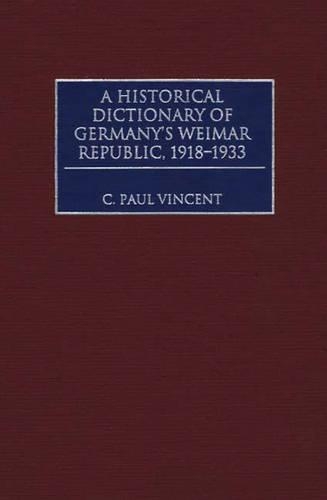
A Historical Dictionary of Germany's Weimar Republic, 1918-1933
(Hardback)
Publishing Details
A Historical Dictionary of Germany's Weimar Republic, 1918-1933
By (Author) C. Paul Vincent
Bloomsbury Publishing PLC
Greenwood Press
14th August 1997
United States
Classifications
Tertiary Education
Non Fiction
Reference works
943.08503
Physical Properties
Hardback
648
Description
The failure of Germany's first republic after World War I has aroused several decades of concentrated study. Synthesizing much of that study, this historical dictionary aims to enhance an understanding of the Weimar Republic. It includes entries on individuals as diverse as Bertolt Brecht, Adolf Hitler, the physicist Lise Meitner and the film director Georg W. Pabst. There are also entries defining such events as the Beerhall Putsch and the French occupation of the Ruhr; various organizations and institutions, such as the Frankfurt School; the complex array of political parties; and treatment and agreements, such as the Locarno Treaties of 1925 and the 1929 Young Plan. Arranged as an A to Z reference source for the study of modern German history, the dictionary gives substance to cultural terms (such as Dada), to film and music, and to concepts such as anti-semitism and justice, deemed vital to an understanding of the period. All entries conclude with bibliographic references.
Reviews
This reviewer is impressed with its comprehensiveness as well as the conciseness and clarity of the entries. . . . An especially full index shows all the locations where the subject is mentioned. * Choice *
Paul Vincent has provided us with an invaluable reference, one which should be seen as essential for anyone who is interested in the Weimer Republic. His dictionary is much more than a compendium of information about Weimar. Each of the entries is a thorough introduction to its subject and is carefully cross-referenced to related articles in the book. The source references at the end of each entry are invariably well chosen. The dictionary offers a ruly panoramic view of Weimar with articles on everything from party politics to popular entertainment, from Adolf Hitler to Marlene Dietrich. The breadth of reference is never at the expense of careful research; the scholarly craftsmanship and authority are evident throughout, as is balance.There is also a refreshingly straighforward character to the writing Vincent does not shy away from controversy, nor does he avoid coming to his won conclusions when it seems appropriate to do so. * German Studies Review *
The dictionary captures the unsettled nature of the times by explaining competing ideologies, describing intellectual threads, charting the activities of politicians, and analyzing the impact of institutions. Artists and business leaders figure as prominently as politicians. The ample articles conclude with reference to items in the extensive bibliography. The thoroughness of the index matches the quality of the scholarship evident in the articles. . . . European history collections will be incomplete without this informative, excellent new reference source. * Rettig on Reference *
Author Bio
C. Paul Vincent received his PhD at the University of Colorado. While serving as a librarian, he has taught history at Franklin and Marshall College and Keene State College. He was library director at Keene from 1985 to 1994. He is the author of The Politics of Hunger: The Allied Blockade of Germany 1915-1919 (1985).
